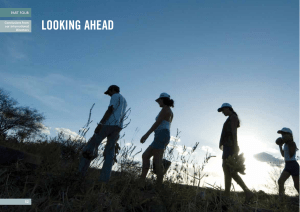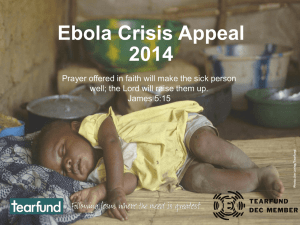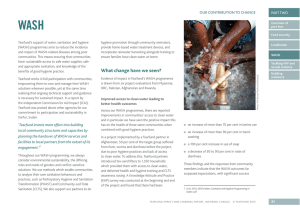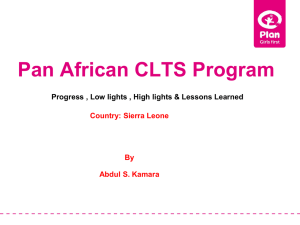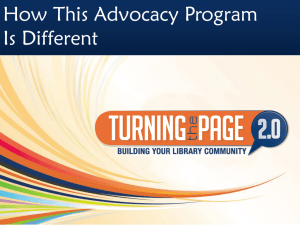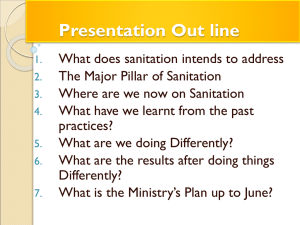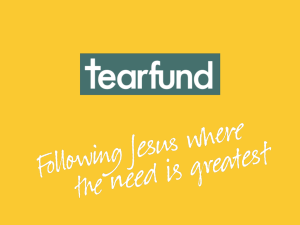Tearfund: Advocacy in WATSAN Emergency Programmes
advertisement
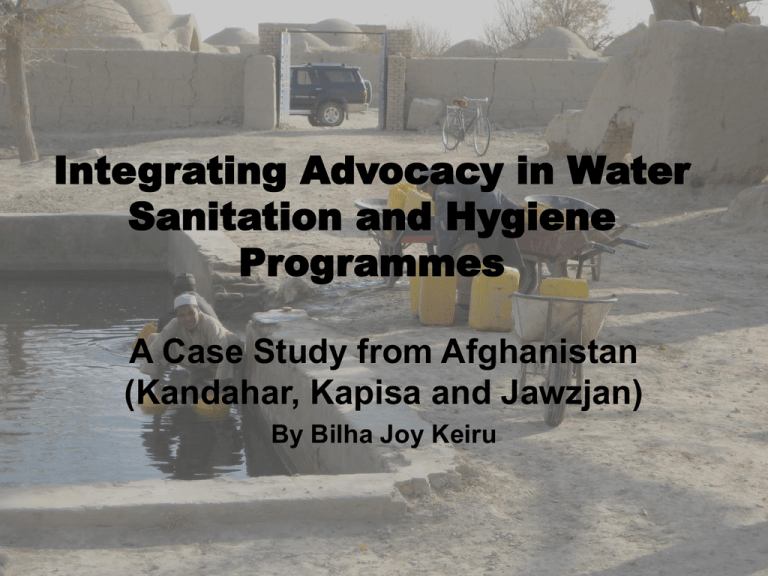
Integrating Advocacy in Water Sanitation and Hygiene Programmes A Case Study from Afghanistan (Kandahar, Kapisa and Jawzjan) By Bilha Joy Keiru Tearfund Definition of Advocacy ‘Seeking with, and on behalf of, the poor to address underlying causes of poverty, bring justice and support good development through influencing the policies and practices of the powerful’. Source: Tearfund Advocacy Toolkit: Understanding Advocacy What is Advocacy in Emergencies? Definition: “Deliberate efforts based on demonstrated evidence, to persuade those in authority to adopt certain policies or actions in order to protect people affected by disasters or by conflicts” Source: The Human Right to Water and Sanitation in Emergency Situations: The Legal Framework and a Guide to Advocacy (2009) Source: From the Grass-Roots to the Security Council: Oxfam’s Humanitarian Advocacy in Darfur, the DRC and Uganda (2008) In Practice, Advocacy in Emergencies Draws in factual and up –to-date information, often gained by organisations active on the ground Is focused on specific aspects of the situation i.e. geographical location, stakeholders and beneficiaries Establishes a link between broad policy context and a particular crisis situation Sends out a clear and relevant message of change, assigning responsibility to the appropriate stakeholders to take specific action Source: The Human Right to Water and Sanitation in Emergency Situations: The Legal Framework and a Guide to Advocacy (2009) A Case Study from Afghanistan: Using advocacy in programmes & learning from the field to influence the National WASH policy The case study highlights areas where advocacy tools integrated in a Biosand filter and Community led Total Sanitation (CLTS) project led to success with good practice from the field being used to advocate for the inclusion of better water and sanitation standards and policies during the revision of the Afghan National WASH Policy. The Water and Sanitation Crisis: A Crisis of Governance? The Capability Accountability and Responsiveness AnalysisHelps develop a much better understanding of the policy and political context in which an organisation is working, either programmatically or in advocacy Resource can be found on Tearfund Website at: http://tilz.tearfund.org/Research/Water+and+Sanitation+reports/Understanding+the+WASH+sect or+2010.htm Networking: Being an active member of the UNICEF WASH Cluster and building relationships with Government ministries Knowing who is who and letting others know who you are creates legitimacy i.e. Building relationships with Government ministries, Govt. technical staff, provincial government functionaries e.t.c Kapisa visit to Tearfund field sites (CLTS and Biosand filters) Photo: Woman Training on Hygiene promotion Networking allows you to be able to share knowledge in similar areas of work- know what's going on around you i.e. Successes and challenges Tearfund Biosand Filter Training Workshop in November 2008 Workshop conducted in Kabul by UNICEF/CAWST and Tearfund provided support (November 2009) Using a platform like the UNICEF cluster enhances chances of impact, especially when spaces open that allow you to input to national policies and strategies- Water, Sanitation and gender taskforce Photo: Tearfund Biosand filter Workshop 2008 Lobbying: Local leaders, religious leaders, the business communities, the media and the local and national government •Created awareness on the issue of water and sanitation at local level •Enhanced women’s participation •Encouraged religious leaders to incorporate WASH in their teaching in the mosques-opened up spaces for engaging with communities due to legitimacy Photo: Women participate in the CLTS Project •Business communities engagedenhanced sustainability •Lobbying Radio to incorporate Corporate Social Responsibility in their Work Photo: Religious leader officially launching the Biosand Filters Media: The Use of Local Radio Stations •Using radio for hygiene promotion activities on radio programmes-Radio Clubs •Using radio to advertise products i.e. the biosand filters •Using radio to create awareness during international day celebrations •Using radio to pass on information to communities e.g. visits by govt. officials Photos: Radio Presenter taking Man’s and Children’s views during World Water Day 2009 Knowledge Management: Documentation of lessons learned and sharing this to a wider audience •Presenting case studies to government officials, local authorities and donors to let them know what is going on both locally and nationally during lobbying meetings Photo: Tearfund lobbying local authorities •CAWST BSF Training in Nairobi 2010- Regional Interagency Workshop- Shared good practice from Afghanistan Awareness Raising: International Day celebrations Celebration of International Days pertaining to Water and Sanitation even at local level : 1. Photo: GHWD in Afghanistan 2. Photo: 2010 WWD Brochure Photo: Interview during World Water Day 3. World Water Day- 22nd March Global Handwashing Day15th October World Toilet Day-19th November Impact Policy Change: National Afghanistan WASH Policy •The inclusion of Household Water Treatment in the National PolicyBSF •Inclusion of CLTS approaches in the national sanitation policy Impact: •Increased donor funding in the WASH Sector – BSF and CLTS in other areas in Afghanistan- USAID Funding 60 million 3 years •Learning from the field on the inclusion of methods used to enhance women’s participation in WASH projects •A move to demand –led approaches Source: From the Grass-Roots to the Security Council: Oxfam’s Humanitarian Advocacy in Darfur, the DRC and Uganda (2008) Changed Lives Interview -Mrs. Bobo Gol story focuses on dignity The Biosand Filter Story- Highlight the improvement in livelihoods, Access & Availability Latrine THE END Stream: Water Source
